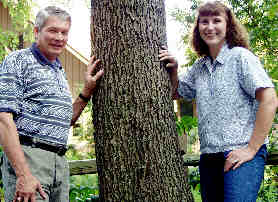| 10-14-02
It is never easy--and often is imprudent--to even hint that tried and
true methods or products could be augmented or replaced.
And so it is with some trepidation that this column points out that
there are new kids on the block in the area of dendrology, the scientific
study of trees, or mere tree enthusiasm, including hundreds of thousands
of school kids and their parents who must help their offspring with the
annual school leaf collection project.
The thing that is bringing about this revolutionary change in the study
of trees is a brand spanking new CD, Trees
of Indiana, recently published (if that is how CDs come into
this electronic world) by the Purdue University Agricultural Communication
Department.
The “new kids," originators of the CD, are Sally Weeks, who has turned
her MS thesis into the greatest aid to the study of trees I have ever seen
(focused on Indiana’s native trees), and Dr. George Parker, who needs no
introduction to Hoosier conservationists and the state’s scientific community.
How the Department of Natural Resources (DNR) has managed to look past
Dr. Parker when doling out “Conservationist of the Year” awards in the
last 10 years is a mystery to this old geezer. If they do it again, the
entire DNR should be dragged in (kicking and squealing) for a round of
saliva tests.
George Parker’s is best known to conservationists of the state for his
“one-man-gang” effort that convinced mamby-pamby politicians that the flora
of our state parks system must be protected from a burgeoning deer herd.
He has been at the fore in many areas of resource conservation in Indiana,
including teaching forest-related courses at Purdue for more than 30 years.
Sally, who also earned her BS degree in forestry at Purdue, has amassed
more than 8,500 digital images of trees, their leaves, buds, twigs and
other features. Dr. Parker was Sally’s major professor in her quest for
her MS. Her thesis turned into this CD.
My copy came in the mail last Saturday afternoon, but I did not have
a chance to slip it into the CD bin of my computer until later that night.
Imagine my surprise when the computer screen blinked a couple of times
and this beautiful piece of work flashed in full, living color on my screen.
It is so easy to use that even an electronics basket case such as this
old geezer can figure it out in a few minutes. Imagine how those little
people, computer experts that they are, will handle it.
Just slip the CD in your computer, close the gate and marvel as this
plain-language text on white screen explains the purpose and operation
of this new teaching/learning tool. Down the left side of the screen you
will see several options.
Click on "Species List" and you will get a list of 102 trees native
to Indiana. The CD includes useful data on 16 introduced species.
Click on a species and you will get the scientific name of the tree,
Latin or Greek words from which the name derived, and other interesting
facts. Additional text will give you many interesting pictorial facts about
the species, including leaves, buds, fruit (seeds), and other facets of
the total picture.
To get back to the species list, you merely click on “Back,” and to
get back to your boring life, just click on the acorn “Quit.”
To get an order form for the CD, write: Agricultural Communication,
Media Distribution Center, 231 South University Street, West Lafayette,
IN 47907-2064. The e-mail address for ordering the CD is: media.order@purdue.edu.
The price is $25.00.
To imply that the Trees of Indiana CD transcends the work
of the late and great Charles Deam, and his book of the same name, would
border on sacrilege. But it certainly augments Deam’s work, even in view
of the fact that the CD will be improved in the future.
It seems to me that this CD--in its present form--belongs in every library
of the state, especially those of schools and communities. It can lead
to a better understanding of trees and their importance in our lives. If
you have a CD player, you should own Trees of Indiana.

|
|
 |
Creators
of the CD, Trees of Indiana, are Sally Weeks, right, and
Dr. George Parker, of the Purdue University Forestry and Natural Resources
Department. |
|

